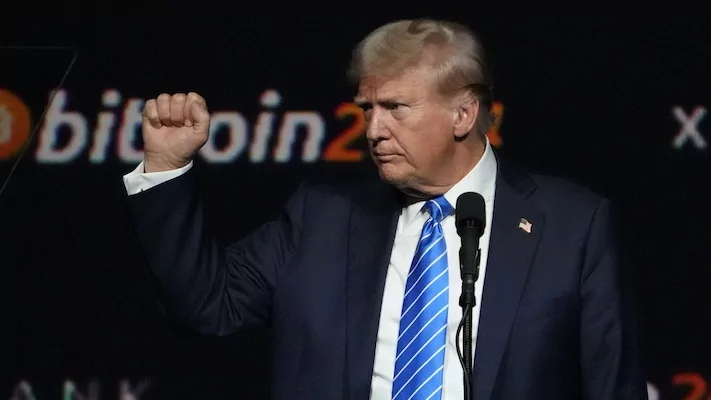

President-elect Donald Trump is shaking up what has been a sleepy final weeks of Joe Biden’s presidency with a flurry of nominations that are setting the tempo for his second term.
Trump rolled out the most controversial choices for his Cabinet early, giving days of oxygen to nominees who may not stand a chance at Senate confirmation. Others he named in perfunctory statements announced in a Friday night news dump.
Trump’s free-wheeling style and comfort with drama were defining features of his first four years in office, keeping the press and his own Republican allies on their toes.
But, Biden’s relatively conventional and oftentimes media-averse presidency is making Trump’s decision-making even more stark this time around.
Trump will not enter the Oval Office for another two months, but he is already upending the way Washington functions for the next four years.
“Anything that President Trump does garners press. He is the ultimate in clickbait,” said Vince Galko, a veteran Republican strategist in Pennsylvania. “I think many in the news media would not admit it, but another four years of Donald Trump gets a lot more quick clicks and gets a lot more ratings than maybe four more years of Kamala Harris would have.”
KEY DATES FOR THE 2024 PRESIDENTIAL TRANSITION
Trump embraces controversy with Cabinet picks
Most of Trump’s Cabinet nominations are not especially controversial, but the ones that are have driven a weekslong news cycle focused on scandal and fitness for office.
Trump tapped former Florida Rep. Matt Gaetz, embroiled in sexual misconduct allegations, as his nominee for attorney general, to the shock of GOP senators. Eight days later, Gaetz dropped out with the possible release of a House Ethics Committee report hanging over his head.
Three other Cabinet nominees have sexual scandals swirling around them, though all deny the charges against them. Meanwhile, nominees such as Tulsi Gabbard, an anti-war firebrand chosen to lead the intelligence agencies, have caused bipartisan heartburn.
The nominations reflect Trump’s willingness to disregard scandals that in the past would have ended politicians’ careers. He is also testing the limits of Senate Republicans’ deference to him. He could not get Gaetz appointed, but the GOP majority in the Senate will be reluctant to torpedo too many others.
“I think he may have thought he had carte blanche when he nominated Matt Gaetz. I think maybe Trump thought, ‘I’ve helped all these senators win. We have a three-seat majority, I’m going to get what I want,’ and I don’t think that’s true,” said Matt Dole, a Republican political consultant based in Ohio. “But … I think Trump will be able to achieve a lot of what he wants over the screaming and yelling and harangue of his opponents.”
WHAT TRUMP HAS PROMISED TO DO ON DAY 1 IN THE OVAL OFFICE
Trump signals break from ‘boring’ Biden
During his first term, impromptu press conferences were a fixture for Trump, whereas Biden gave more limited access to the press.
Trump’s penchant for making news on social media also separated the two men, with a single controversial statement forcing Republican lawmakers to defend or downplay his actions to reporters.
“I think President Trump likes to bypass the media filter, and I don’t know that we will see him go back from that and use a more sort of Biden-esque if you will, or establishment way of doing things,” said Dole. “I think Trump will continue to use the tools available to him to share news and frame news the way he wants to see a frame.”
Already, Trump has relied heavily on Truth Social to roll out his Cabinet picks, and he’s done so at a breakneck pace, much faster than other modern presidents. Weeks after winning a second term, Trump has already announced his entire Cabinet.
Biden was elected, in part, on a message that he would return the country to a sense of “normalcy,” using Trump’s remarks on the white supremacist rally at Charlottesville as one flashpoint. This cycle, Democrats made the same case — that voters should not return to the tumult of the Capitol riot.
The messaging represented an attempt to foster a sense of exhaustion with Trump. But Woodrow Johnston, a Republican consultant based in Las Vegas, cited an electoral “mood shift” that outweighed any concerns about the way Trump governs.
“Joe Biden did run as being boring, or I guess a return to normalcy is how they would characterize it,” Johnston said. “But the mood shift in America happened where normalcy or boring resulted in hyperinflation.”
Riding that anger, Trump swept all seven battleground states, won the popular vote, and made historic inroads with minority voters, culminating in his electoral victory on Nov. 5.
HOW TRUMP’S PROMISE TO ABOLISH THE DEPARTMENT OF EDUCATION WOULD WORK
Trump learns from mistakes of first term
Trump’s first term was famous for the firing or resignation of a slate of officials. In one notable example, Trump dismissed former FBI director James Comey in a surprise announcement in 2017, as Comey was investigating the Trump campaign’s alleged ties to Russian interference in the 2016 election.
There could be a reprise of Trump abruptly firing officials like special counsel Jack Smith, who launched two criminal investigations into the president-elect over his actions following the 2020 election and the mishandling of classified documents. Smith, on Monday, filed to have both cases dismissed.
But Trump’s choice of Cabinet nominees could also signal calmer waters in a second term. He has placed a high premium on loyalty this time around as he weighs his appointments, with his sons, Donald Trump Jr. and Eric Trump, sitting on his transition team to personally vet names.
Trump enters second term in confrontation mindset
In the policy space, Trump is already signaling a showdown with Democrats. He has promised to begin mass deportations once sworn in, while the hard line he took during a fight over government funding earlier this year suggests he will push Congress into a more combative posture.
Democrats have already committed to waging a fight of their own, with many of the executive actions he plans to take expected to land in court.
“Whenever there’s change, you’re going to have people opposed to it, and certainly when you have large change, which it looks like we’re headed to with a new Republican administration, as opposed to the current Democratic administration,” Galko said of Democrats and centrist lawmakers. “Also, because people need to raise money, they need to stay viable. They need to show their base that they’re still fighting and working even despite a pretty tough election year.”
Lorna Romero Ferguson, a Republican political strategist based in Arizona, pointed to Trump’s freedom from running for election again as an example of why he might aggressively push to enact his agenda.
“I do think he feels emboldened to get certain things done,” she said. “I think if he feels that there’s any kind of reluctancy or pushback to accomplish what he’s trying to do, he’s going to figure out other ways to do it. And he’s made that very clear in some of his messaging and even the messaging from some of his advisers that he’s appointing.”
CLICK HERE TO READ MORE FROM THE WASHINGTON EXAMINER
That attitude could also put Trump at odds with some Republicans in Congress. Trump has signaled interest in more control over the Federal Reserve, likely by pushing out Fed chairman Jerome Powell, which his treasury secretary pick Scott Bessent would be in charge of.
His views on tariffs and less hawkish views on the war in Ukraine could become points of friction as well. In the Senate, Sens. Susan Collins (R-ME), Lisa Murkowski (R-AK), and Mitch McConnell (R-KY) could thwart some of Trump’s legislative plans.





